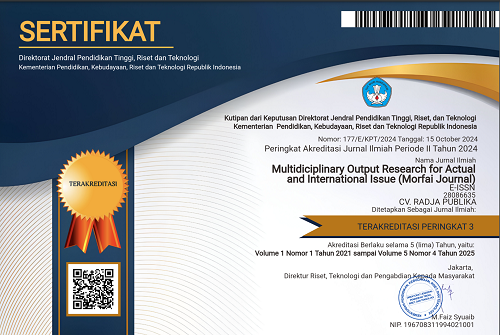THE EFFECT OF FREE DRAWING ABILITY AND EMOTIONAL INTELLIGENCE ON THE DEVELOPMENT OF CREATIVITY FOR CHILDREN AGED 5-6 YEARS IN EARLY CHILDHOOD EDUCATION MARTABE KASIH, SILIMABAHAL VILLAGE, SIBORONGBORONG DISTRICT
Main Article Content
Sartika Sareany Tambunan
Syamsu Nahar
Wahyudin Nur Nasution
This study aims to determine (1) free drawing activities have a significant influence on children's creativity, (2) emotional intelligence has a significant influence on children's creativity, and (3) the interaction between free drawing activities and emotional intelligence has an influence on children's creativity. The research method used in this study is a quasi-experimental method with a 2x2 factorial design. The study population was all children of PAUD Martabe Kasih, Silimabahal Village, Siborongborong District aged 5-6 years, consisting of 2 classes totaling 48 children. The sample of this study was for the control group, namely the children of group B1 which amounted to 24 children, while the experimental group, namely the children of group B2, which amounted to 24 children. The results of this study are (1) there is a positive and significant effect of free drawing activities on children's creativity, this is evident from Fcount 133.87 > Ftable 3.972. In this case, the average results of the creativity test of children who are taught with free drawing activities are higher than those of drawing activities with teacher instructions, so it can be concluded that free drawing activities are more effectively applied in learning to increase children's creativity. (2) there is a positive and significant effect of emotional intelligence on children's creativity, this is evident from Fcount 6.03 > Ftable 3.972. In this case, the average results of creativity tests for children with high emotional intelligence as a whole, both those taught with free drawing activities and drawing with teacher instructions, are higher than the average results of creativity tests for children with low emotional intelligence, and (3) there is an interaction of free drawing activities and emotional intelligence that have an influence on children's creativity, this is evident from Fcount 7.09 > Ftable 3.972. In this case, the average creativity test results of children with high emotional intelligence are better taught using free drawing activities compared to using drawing activities with teacher instructions, while children with low emotional intelligence are better taught using drawing activities with teacher instructions compared to children with low emotional intelligence. free drawing activity.
Desra Mega Pertiwi dan Farida Mayar. 2020. Pengaruh Kegiatan Menggambar Bebas Teknik Graffito Terhadap Seni Rupa Anak Usia Dini di Taman Kanak-Kanak Aisyiyah V Padang. Jurnal Pendidikan Tambusai, Volume 4 Nomor 1 Tahun 2020.
Eka Sriwahyuni dan Nasriah. 2021. Pengaruh Menggambar Terhadap Kecerdasan Visual Spasial Anak Usia 5-6 Tahun di TK Daruz Zikra Medan Tuntungan Tahun Ajaran 2019/2020. Jurnal Usia Dini Universitas Negeri Medan, Volume 7 No 1 Juni 2021.
Mashar, Riana. 2015. Emosi Anak Usia Dini Dan Strategi Pengembangannya. Jakarta: Penada Media Group.
Putra, Musa dan Dwi Lestari Ninin. 2013. Penelitian Kualitatif: Pendidikan Anak Usia Dini. Jakarta: Raja Grafindo Persada.
Rofiko Sari dan Basuki Hadi Prayogo. 2019. Pengaruh Kegiatan Menggambar Terhadap Kreativitas Anak Usia 5-6 Tahun di TK Dharma Wanita Wirolegi Sumbersari Kabupaten Jember. JECIE: Journal of Early Childhood and Incluxsive Education, Volume 2, Nomor 2, Juli 2019)
Rusdarmawan. 2009. Children’s Drawing dalam PAUD. Bantul: Kreasi Wacana.
Sumanto. 2006. Pengembangan Kreastivitas Seni Rupa Anak Sekolah Dasar. Jakarta: Departemen Pendidikan Nasional, Direktorat Jenderal Pendidikan Tinggi, Direktorat Pembinaan Pendidikan Tenaga Kependidikan, dan Ketenagaan Perguruan Tinggi.
Yashinta Aplina Nona, dk.2019. Pengaruh Metode Menggambar Bebas dengan Teknik Menarik Benang Terhadap Kreativitas Anak Kelompok B di TK Gerbang Indah Malang. Prosiding Seminar Nasional, Pendidikan dan Pembelajaran Bagi Guru dan Dosen, Vol. 3, Tahun 2019.
Wahyuddin Nur Nasution. 2018. Pengaruh Pendekatan Pembelajaran Berbasis Inkuiri dan Kecerdasan Emosional Terhadap Tingkat Prestasi Belajar Sains Siswa. Journal of Turkish Science Education, Volume 15, Issue 4, December 2018.
Sartika Sareany Tambunan, Universitas Islam Negeri Sumatera Utara
<strong>International Review of Practical Innovation, Technology And Green Energy (IRPITAGE)</strong> is a scientific journal that presents the results of scientific works sourced from Community Service in Indonesia. Contains All Forms of Novelty Innovations in both scientific science and technology, as well as issues of limited energy and the social environment in society.This journal is intended as a medium for scientific studies of research results from implementation to the community, thoughts and critical-analytic studies on various issues that can be utilized both nationally and internationally. The scientific article is in the form of a study of the implementation of Community Service that can be accounted for and disseminated nationally and internationally. IRPITAGE Journal from Radja Publika as part of the spirit of disseminating knowledge resulting from community service carried out by researchers in Indonesia. The IRPITAGE Journal from Radja Publika provides articles that can be downloaded for free. With a schedule of publications 3 (three) times a year.









